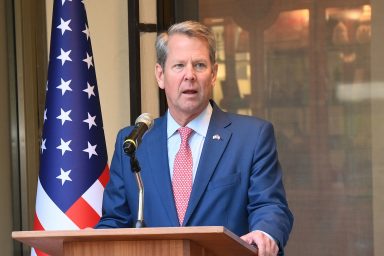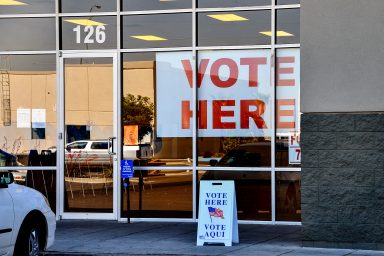Texas Democrats stalled a restrictive voting bill from becoming law, in an echo of their previous performances starring Wendy Davis.
In Texas, dramatic political gestures sometimes work, something that Democrats knew well as they walked out of chambers before Republicans could pass Senate Bill 7, a harsh voting bill that would have cut early voting hours, abolished drive-thru voting, and generally made it more difficult for voters of color to cast their ballots.
Theatrics aren’t new to Texas politics. In 2013, Democratic state Sen. Wendy Davis filibustered for more than 13 hours against a restrictive abortion bill, in a bid that got national attention. Using a back brace and sporting hot pink running shoes, she talked and walked until the Republicans could finally stop her on technicalities. But time ran out on the legislative session, and Republicans couldn’t pass the measure until a new session was called.
Texas Gov. Greg Abbott (R) brought the supposed defeat up on Twitter this week, in reference to the latest drama.
“The last time a stunt like this happened was…Wendy Davis. We all know how that ended,” Abbott tweeted.
“Yes, we do know how it ended. We didn’t give up, took that unconstitutional anti-abortion bill all the way to the Supreme Court and got it overturned. News flash, dude — we won’t give up this time either. #txlege,” Wendy Davis quipped back in kind.
Indeed, the abortion law was overturned by the Supreme Court. The court’s makeup this time around is different, however, and if passed, the voting bill has a good chance of being upheld.
Democratic activists charge that the only way Republicans can maintain their control of the state is by continuing to suppress the vote.
“Republicans are faced with an existential question. They can either change their policies to be better in line with what most Texans want, and less radical, or they can prevent more Texans from voting in the first place so that they can stay in power,” said Rose Clouston, voter protection director for the Texas Democratic Party. “This Republican Legislature is not interested in protecting Texans’ rights. As they showed, they are simply interested in preventing as many people from voting as possible.”
Republicans insist what they are trying to do is curtail voting fraud, though they’ve been hard-pressed to cite any examples. Voting rights activists say SB 7 intentionally targets Black and Latinx communities with the Democratic Legislative Campaign Committee describing it as “one of the worst [voting laws] we’ve seen.”
For instance, it zeroes in on Harris County, which is home to Houston.
The Laws
Harris County’s 24-hour voting system, used last November, would be eliminated under this new legislation. The new early voting hours would be 6 a.m. to 9 p.m. Monday through Saturday and 1-9 p.m. on Sundays, barring churches from conducting popular “souls to the polls” voting drives after morning services. Some Republicans are now considering certain concessions on the Sunday voting hours.
People of color used drive-thru voting sites, now slated for elimination, more frequently than white, with 53 percent of early drive-thru votes last November coming from Hispanic, Black, and Asian voters, according to the Texas Civil Rights Project. This law also discriminates against people with disabilities who may need to vote in a seated position and may not be able to walk into older voting facilities.
To vote by mail, Texans would have to specifically request a ballot, as opposed to having ballots automatically sent out to registered voters. Those who request one must also provide valid identification with either a driver’s license or Social Security number. Poll workers and election officials could face fines up to $1,000 and potential jail time if they send a ballot to someone who didn’t request one.
Democrats say the peculiarly harsh punishments for poll workers and election officials who make any mistake in the mail-in ballot process could significantly deter volunteers from participating in the next election, making the chances of a smoothly run voting process much less likely.
“I’ve had poll workers tell our folks ‘I’m not going to serve as a poll worker again if this bill passes.’ It criminalizes mistakes from poll workers who receive minimal training and are volunteers — they’re trying to do a good job and trying to do their civic duty. And it would put them in jail for mistakes,” Clouston said. “We all want smooth and well-run elections. But these bills are not the way to do it.”
SB 7 also allows partisan poll watchers — observers in polling places who can report any suspicious voting behavior to authorities — to videotape voters who need assistance filling out their ballots, if the watcher believes that the help is unnecessary. Voting rights activists say poll watchers can be seen as intimidating, and this bill could discourage potential voters from turning out of fear for their privacy.
“That is completely antithetical to running a smooth election where voters feel welcome and want to be in the polling place and are going to wait to cast their ballot when that’s necessary,” Clouston said. “[This law] would inherently target the disability community and Latino and Asian Americans, because those are the folks who receive and need language assistance in Texas.”
Why Now
In November 2020, there was a record turnout in Texas, and every year Democrats are inching closer to winning more elections. Therefore, it is no coincidence that SB 7 was proposed in early 2021, just months after the presidential election.
President Joe Biden referred to the bill as “un-American” and “an assault on democracy” in a statement to the Texas Tribune on May 29. Texas follows closely in the footsteps of Florida and Georgia, who have also recently passed restrictive election bills.
The goal of SB 7 was ostensibly to preserve “election integrity and security,” reflecting Donald Trump’s false claims of voter fraud after he lost the 2020 presidential election. However, critics charge that the bill in fact damages election integrity due to the partisan rules that will result.
Although SB 7 could soon be signed into law, there are two congressional bills that could challenge SB 7: the “For the People Act” (HR 1), and the “John Lewis Voting Rights Advancement Act” (HR 4).
HR 1 is a federal bill that would expand voting accessibility by allowing same-day registration, solidify election security by requiring paper ballots, strengthen the representation of people’s voices by promoting small donors, amplify integrity by requiring presidential candidates to disclose their tax returns, and fight against gerrymandering. The Senate is scheduled to vote on HR1 in the last week of June, though it could be blocked by a Republican filibuster.
HR 4 is named after the late activist and congressman from Georgia John Lewis and is an attempt to restore the 1965 Voting Rights Act, which was partially reversed in 2013 with the Supreme Court case Shelby County v. Holder. The act would ensure election legitimacy by expanding election monitoring and requiring many states to receive preapproval from the Department of Justice or the U.S. District Court for the District of Columbia before making legal changes that would affect voting rights.
Related front page panorama photo credit: Adapted by WhoWhatWhy from Phil Roeder / Flickr (CC BY 2.0).



